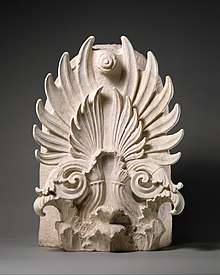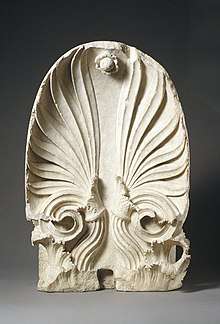Acroterion
An acroterion or acroterium or akroteria[1] is an architectural ornament placed on a flat pedestal called the acroter or plinth, and mounted at the apex or corner of the pediment of a building in the classical style.[2] An acroterion placed at the outer angles of the pediment is an acroterion angularium (angulārium means ‘at the corners’).



The acroterion may take a wide variety of forms, such as a statue, tripod, disc, urn, palmette or some other sculpted feature. Acroteria are also found in Gothic architecture.[3] They are sometimes incorporated into the design of furniture.[4]
The word comes from the Greek akrōtḗrion (ἀκρωτήριον 'summit, extremity'), from the comparative form of the adjective akros (ἄκρος, 'extreme, endmost'). It was Latinized by the Romans as acroterium.[5] Acroteria is the plural of both the original Greek[6] and the Latin form.[7]
According to Webb, during the Hellenistic period the winged victory or Nike figure was considered to be "the most appropriate motif for figured akroteria".[1]
References
- Webb, Pamela A., Hellenistic Architectural Sculpture: Figural Motifs in Western Anatolia and the Aegean Islands, The University of Wisconsin Press, Madison Wisconsin, 1996 p.26
- "Acroterian". Merriam Webster.
- Harris, Cyril M. (1983). Illustrated Dictionary of Historic Architecture. Courier Corporation. p. 5. ISBN 9780486244440.
- "acroterion - architecture".
- "acroter". Oxford English Dictionary (3rd ed.). Oxford University Press. September 2005. (Subscription or UK public library membership required.)
- Greek Architecture glossary Archived September 8, 2006, at the Wayback Machine
- Acroterium at A Dictionary of Greek and Roman Antiquities, 1875.
External links
| Wikimedia Commons has media related to Acroterion. |